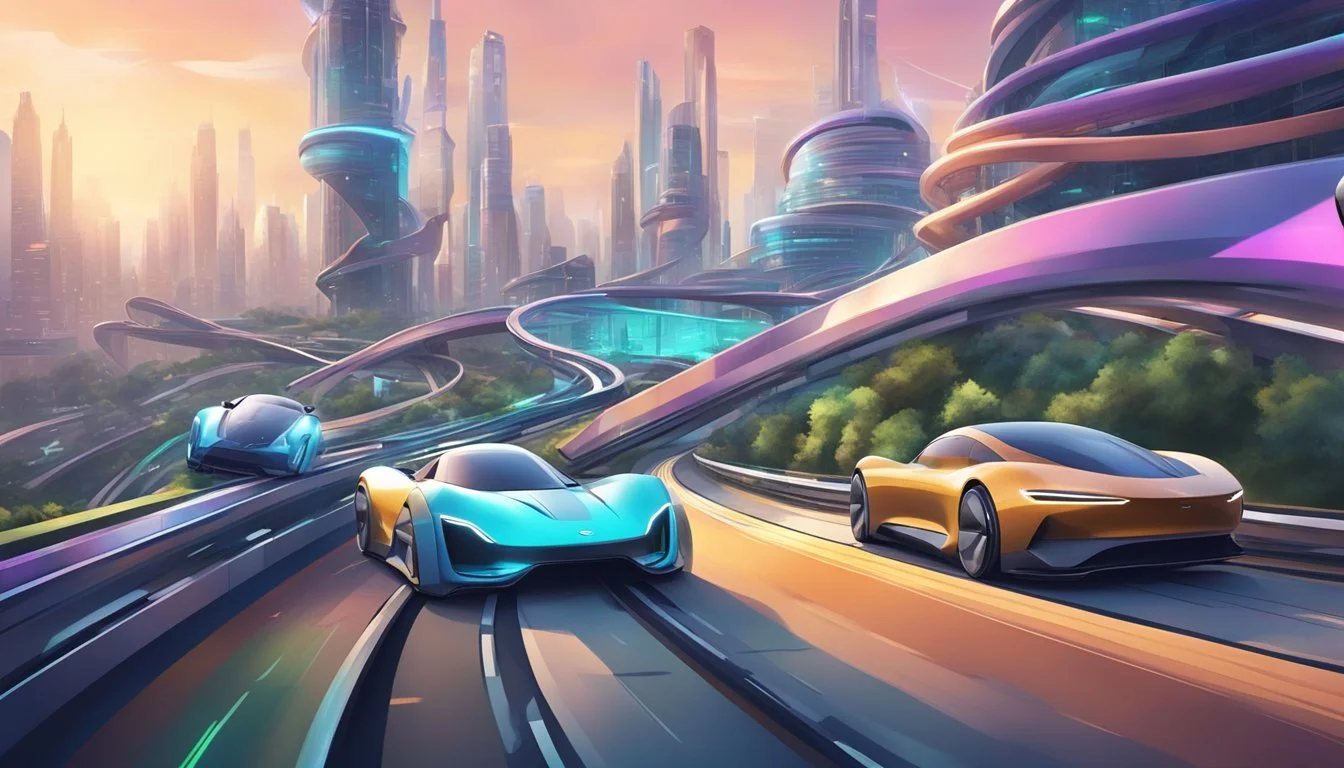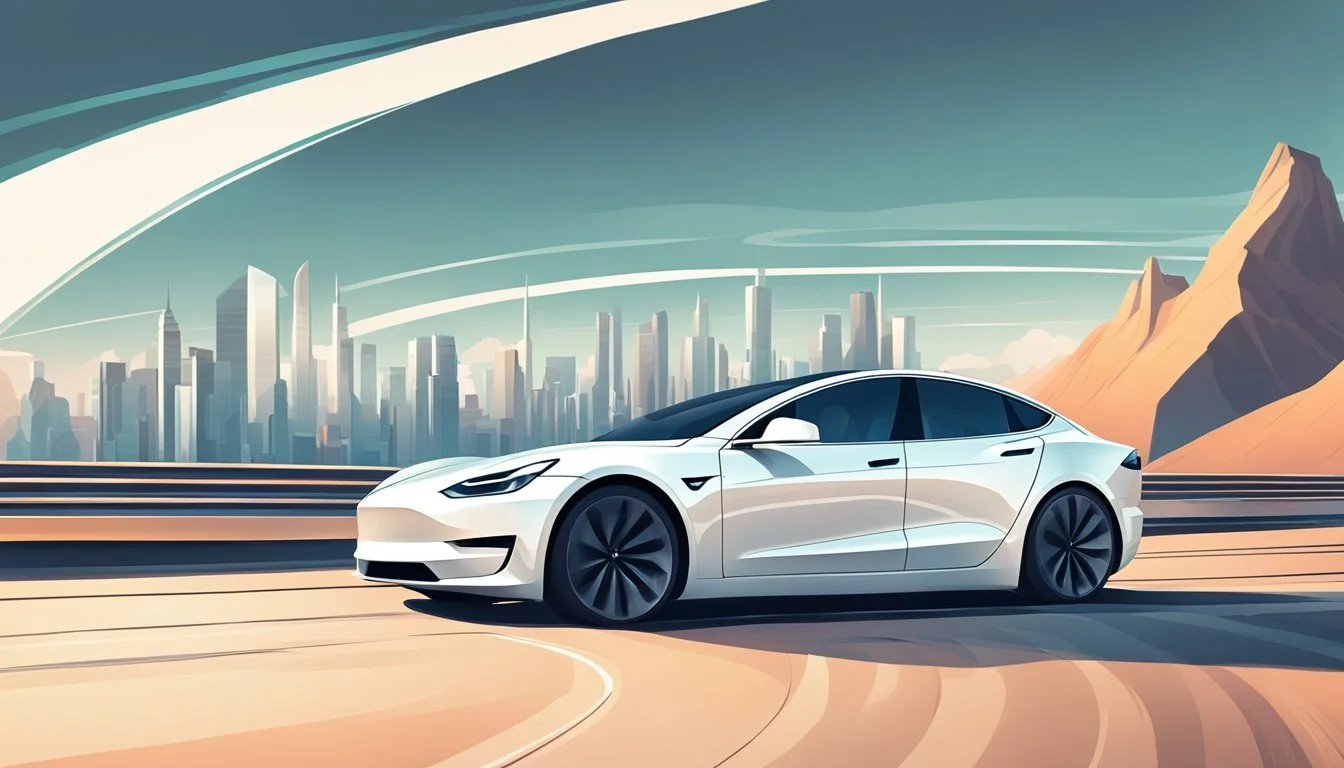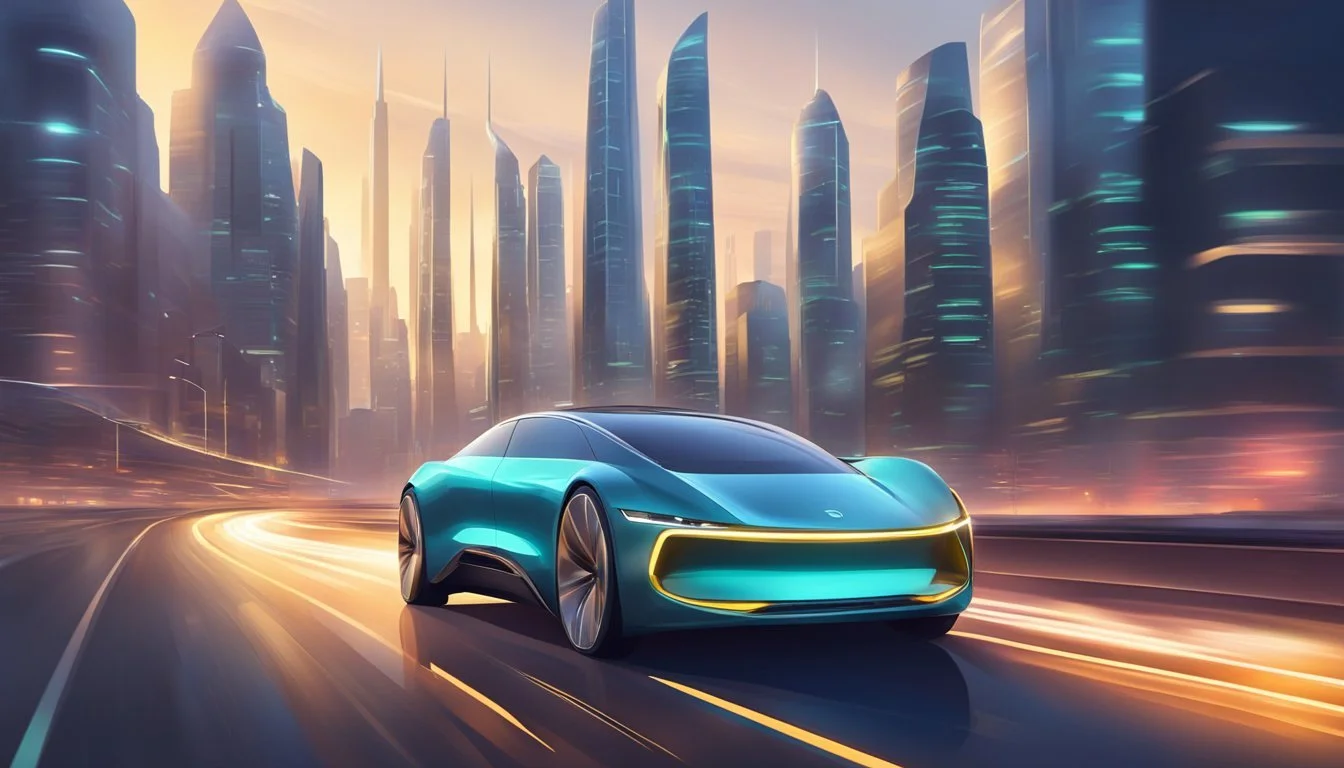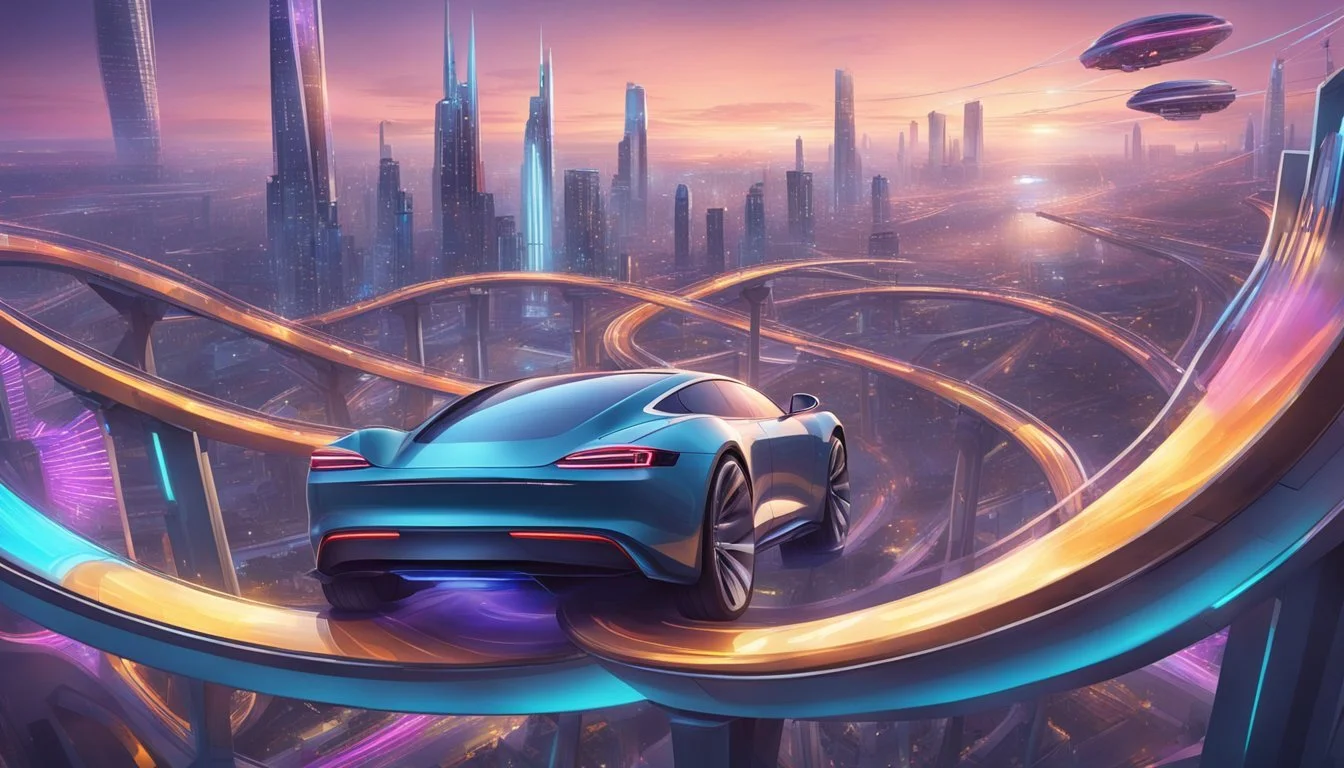Tesla's Rollercoaster Ride
Elon Musk's EV Revolution Explored in New Documentary Series
Tesla's journey under Elon Musk's leadership has been nothing short of revolutionary in the electric vehicle industry. From ambitious plans for affordable EVs to futuristic robotaxis, the company continues to push boundaries and capture public imagination.
Tesla's latest developments include unveiling a robotaxi and renewed discussions about a $25,000 electric car. The robotaxi, showcased at a recent event, features a sleek design reminiscent of Art Deco aesthetics. Meanwhile, investors are eager for updates on the long-rumored budget-friendly Tesla model.
Musk's vision for Tesla extends beyond traditional car manufacturing. The company's ventures into autonomous driving technology and innovative transportation solutions, like the Boring Company's tunnels, demonstrate its commitment to reshaping the future of mobility. As Tesla navigates these ambitious projects, the electric vehicle landscape continues to evolve rapidly.
The Visionary Behind Tesla
Elon Musk's leadership has shaped Tesla into a revolutionary force in the automotive industry. His ambitious vision and innovative approach have driven the company's rapid growth and technological advancements.
Elon Musk's Entrepreneurial Journey
Musk's path to Tesla began with his success in the tech industry. After co-founding PayPal, he turned his attention to sustainable energy and space exploration.
In 2004, Musk joined Tesla as chairman of the board and later became CEO. His bold strategies and hands-on approach transformed the startup into a major player in the automotive world.
Musk's willingness to take risks and challenge conventional wisdom has been key to Tesla's success. He pushed for ambitious production goals and cutting-edge technology, often in the face of skepticism from industry analysts.
Impact on Electric Vehicles Market
Tesla's influence on the electric vehicle (EV) market has been profound. Under Musk's leadership, the company popularized EVs and made them desirable to mainstream consumers.
The launch of the Model S in 2012 marked a turning point. It proved that electric cars could be stylish, high-performance vehicles with long ranges.
Tesla's direct-to-consumer sales model and Supercharger network further revolutionized the industry. These innovations addressed key barriers to EV adoption, such as limited charging infrastructure.
The company's success has spurred traditional automakers to accelerate their own EV programs. This competition has led to rapid advancements in battery technology and EV affordability.
Tesla's Approach to AI and Autonomy
Musk has positioned Tesla as a leader in artificial intelligence and autonomous driving. The company's Autopilot system has pushed the boundaries of what's possible in vehicle automation.
Tesla's approach to AI development is unique in the industry. They rely heavily on real-world data collected from their fleet of vehicles to improve their algorithms.
The company's Full Self-Driving (FSD) beta program allows select customers to test advanced autonomous features. This strategy has accelerated development but also drawn scrutiny over safety concerns.
Musk's ambitious goal is to achieve full autonomy, potentially transforming Tesla into a robotaxi network. While challenges remain, Tesla's progress in AI and autonomy continues to shape the future of transportation.
Tesla's Major Milestones
Tesla has achieved numerous groundbreaking milestones since its founding in 2003. From innovative vehicle launches to significant market expansion, the company has consistently pushed the boundaries of electric vehicle technology and adoption.
From Roadster to Model Y
Tesla's journey began with the Roadster in 2008, marking its entry into the electric vehicle market. The Model S followed in 2012, revolutionizing the luxury sedan segment with its long range and advanced technology. In 2015, Tesla introduced the Model X, an all-electric SUV with distinctive falcon-wing doors.
The Model 3, launched in 2017, became Tesla's first mass-market vehicle. It quickly gained popularity, contributing significantly to the company's sales growth. The Model Y, a compact SUV, debuted in 2020, further expanding Tesla's product lineup.
Each new model showcased improvements in range, performance, and technology. Tesla's vehicles consistently set new standards for electric cars, challenging traditional automakers and accelerating the industry's shift towards electrification.
The Launch of Cybertruck
Tesla unveiled the Cybertruck in 2019, generating significant buzz with its futuristic design and impressive specifications. The all-electric pickup truck promises exceptional performance, with claims of 0-60 mph acceleration in under 2.9 seconds for the tri-motor variant.
Production delays pushed back the Cybertruck's initial release date. However, Tesla has continued to refine the design and manufacturing processes. The company aims to begin deliveries in late 2023, with full-scale production ramping up in 2024.
The Cybertruck represents Tesla's bold entry into the lucrative pickup truck market. Its unique styling and electric powertrain challenge conventional truck design, potentially reshaping consumer expectations in this segment.
Market Share and Business Growth
Tesla's market share in the electric vehicle sector has grown substantially over the years. In many regions, it has become the leading EV brand, outpacing established automakers in electric car sales.
The company achieved profitability in 2013, a significant milestone for the young automaker. Tesla's financial performance has since improved, with increasing revenues and expanding profit margins.
Tesla's success extends beyond vehicle sales. The company has diversified into energy storage and solar products, leveraging its battery technology expertise. This expansion has positioned Tesla as a comprehensive sustainable energy company.
In 2020, Tesla surpassed 1 million electric cars sold globally, cementing its position as a major player in the automotive industry. The company's market capitalization has soared, making it one of the most valuable automakers worldwide.
Autonomous Driving Technologies
Tesla's pursuit of self-driving capabilities has been a cornerstone of its innovation strategy. The company's efforts span software development, hardware upgrades, and regulatory navigation.
Developing the Full Self-Driving Suite
Tesla's Autopilot and Full Self-Driving (FSD) systems represent the company's push into autonomous vehicle technology. Autopilot offers basic driver assistance features, while FSD aims for complete autonomy.
The FSD suite includes advanced features like Navigate on Autopilot, Auto Lane Change, and Smart Summon. These capabilities rely on a network of cameras and sensors to interpret the vehicle's surroundings.
Tesla regularly updates its software over-the-air, adding new features and improving existing ones. The company's AI-powered neural networks continuously learn from the vast amounts of real-world driving data collected from its fleet.
Regulatory Challenges and NHTSA
Tesla's autonomous driving ambitions face ongoing scrutiny from regulatory bodies, particularly the National Highway Traffic Safety Administration (NHTSA).
The NHTSA has launched multiple investigations into Tesla's Autopilot system, focusing on crashes involving emergency vehicles. These probes aim to assess the safety and reliability of Tesla's driver assistance technologies.
Tesla has faced criticism for its beta testing approach, which involves releasing early versions of FSD to select customers. This strategy has raised concerns about public safety and the readiness of autonomous technologies for widespread use.
Comparison with Competitors
In the race for autonomous driving supremacy, Tesla competes with tech giants and traditional automakers alike. Companies like Waymo and Cruise have taken different approaches to self-driving technology.
Waymo, a subsidiary of Alphabet, focuses on developing purpose-built autonomous vehicles with extensive sensor suites. Cruise, backed by General Motors, has pursued a similar strategy with its own fleet of custom-designed autonomous vehicles.
Tesla's approach differs by relying primarily on cameras and neural networks, eschewing more expensive lidar systems. This strategy allows for broader deployment across its existing vehicle lineup but faces challenges in achieving full autonomy.
While competitors have made significant progress in geofenced areas, Tesla aims for a more scalable solution that can work in diverse environments without pre-mapping.
Tesla's Electric Vehicle Innovation
Tesla has revolutionized the automotive industry through groundbreaking electric vehicle technology. The company's advancements in battery efficiency, sleek design aesthetics, and expansive charging infrastructure have set new standards for the EV market.
Battery Technology and Efficiency
Tesla's battery innovations have significantly improved electric vehicle range and performance. The company's latest battery cells boast higher energy density, allowing for longer driving distances on a single charge. Tesla has also developed more cost-effective manufacturing processes, potentially bringing EVs closer to price parity with traditional combustion engine vehicles.
Tesla's battery management systems optimize power delivery and longevity. These sophisticated algorithms ensure efficient energy use and protect battery life, contributing to Tesla vehicles' reputation for reliability and long-term value.
Electric Vehicle Aesthetics and Design
Tesla's vehicles are known for their minimalist, futuristic designs. The Model S, Model 3, Model X, and Model Y feature sleek exteriors and spacious, tech-focused interiors. Large touchscreens dominate dashboards, controlling most vehicle functions.
The Cybertruck's angular, stainless steel body showcases Tesla's bold approach to design. This electric pickup challenges conventional automotive aesthetics while promising robust functionality.
Tesla's design philosophy extends to upcoming projects like the Cybercab and Robotaxi, which aim to redefine urban transportation with autonomous capabilities and unique styling.
Infrastructure and Supercharger Network
Tesla's Supercharger network is a key advantage in the EV market. This extensive charging infrastructure allows Tesla owners to travel long distances with minimal downtime. Superchargers can replenish up to 200 miles of range in just 15 minutes.
The company continues to expand its charging network globally, making electric vehicle ownership more practical for a wider audience. Tesla has also introduced urban Superchargers and destination charging partners to provide convenient charging options in various settings.
Tesla's proprietary charging technology and network have set industry standards, influencing the development of EV charging infrastructure worldwide.
Artificial Intelligence and Robotics
Tesla's focus on AI and robotics extends far beyond electric vehicles. The company leverages artificial intelligence to enhance its products and develop autonomous systems. Tesla's innovations in this space aim to revolutionize transportation and everyday life.
Role of AI in Tesla's Ecosystem
AI plays a crucial role in Tesla's ecosystem. The company uses neural networks and machine learning algorithms to improve its Autopilot and Full Self-Driving capabilities. These systems process vast amounts of real-world driving data collected from Tesla vehicles on the road.
Tesla's AI team develops custom hardware and software solutions. The company's custom-built AI chips power its autonomous driving features. These chips enable rapid processing of complex visual data from multiple cameras and sensors.
AI also enhances Tesla's energy products. Smart algorithms optimize energy storage and distribution in Powerwall and Solar Roof systems.
Optimus: Tesla's Humanoid Robot
Optimus represents Tesla's foray into humanoid robotics. This bipedal robot is designed to perform various tasks in homes, factories, and other settings. Optimus leverages Tesla's expertise in AI, computer vision, and neural networks.
The robot features advanced sensors and actuators for precise movement and object manipulation. Its AI-powered brain allows it to learn and adapt to new environments and tasks.
Tesla aims to mass-produce Optimus robots, potentially transforming labor markets and everyday life. The company envisions Optimus assisting in dangerous or repetitive tasks, freeing humans for more creative pursuits.
The Future of AI in Transportation
Tesla's AI advancements are shaping the future of transportation. The company's goal is to achieve full autonomy, enabling vehicles to operate without human intervention. This technology could revolutionize ride-hailing services and logistics.
Tesla is developing an AI-powered robotaxi service. These autonomous vehicles would provide on-demand transportation, potentially reducing traffic congestion and emissions in urban areas.
The company's AI research extends to traffic management systems and smart city infrastructure. These innovations aim to optimize traffic flow and enhance road safety on a larger scale.
Tesla's Media and Market Presence
Tesla's visibility extends far beyond the automotive industry. The company's innovations, controversies, and stock performance captivate global attention, shaping public perception and investor sentiment.
Tesla in the Public Eye
Tesla's products and initiatives frequently make headlines. The Cybertruck's unconventional design sparked widespread discussion and memes. Tesla's Supercharger network expansion continues to garner attention as it reaches new regions.
The company's foray into energy solutions, like the Powerwall and solar roof tiles, broadens its public image beyond cars. Tesla's AI developments, including Full Self-Driving beta and humanoid robots, generate both excitement and scrutiny.
Elon Musk's high-profile persona amplifies Tesla's visibility. His tweets and public statements often trigger media frenzies and impact Tesla's stock price.
Media Coverage and Public Perception
Tesla receives extensive media coverage, ranging from product reviews to corporate analysis. Automotive journalists praise Tesla's performance and technology but sometimes criticize build quality and customer service.
Environmental publications highlight Tesla's role in accelerating sustainable transportation. Business media scrutinize the company's financial performance and market strategies.
Public perception of Tesla varies. Enthusiasts view the company as an innovative disruptor. Critics raise concerns about safety issues, labor practices, and overpromising on technology timelines.
Social media plays a crucial role in shaping Tesla's image. Fan communities share positive experiences, while detractors amplify negative stories.
Investor Relations and Share Value
Tesla's stock has experienced significant volatility. Positive news about production milestones or new technology often boosts share prices. Conversely, missed targets or controversies can lead to sharp declines.
Elon Musk's tweets have notably influenced Tesla's stock. In 2018, his "funding secured" tweet about taking Tesla private led to SEC fines and oversight.
The company's quarterly earnings calls attract substantial investor and media attention. Musk's forward-looking statements during these calls can sway market sentiment.
Tesla's inclusion in the S&P 500 in 2020 marked a milestone for investor confidence. The company's market capitalization has at times exceeded that of many established automakers combined.
The Challenges and Controversies
Tesla's journey has been marked by significant hurdles and public scrutiny. The company has faced questions about its technology, legal challenges, and concerns over its future direction.
Autopilot Safety and Public Concerns
Tesla's Autopilot system has been a source of controversy. While the company touts it as a groundbreaking feature, critics argue it may give drivers a false sense of security. Several accidents involving Tesla vehicles with Autopilot engaged have raised safety concerns.
The National Highway Traffic Safety Administration (NHTSA) has opened multiple investigations into Autopilot-related incidents. Tesla maintains that Autopilot enhances safety when used properly, but some experts question whether the system is ready for widespread use.
Public perception of self-driving technology remains mixed, with many expressing skepticism about its reliability and safety.
Legal Battles and Regulatory Hurdles
Tesla has faced numerous legal challenges and regulatory obstacles. The company's direct-to-consumer sales model has clashed with traditional dealership laws in several states, leading to legal battles and restrictions on Tesla's ability to sell vehicles in certain areas.
Tesla has also encountered regulatory scrutiny over its manufacturing practices and workplace safety. The California Department of Fair Employment and Housing filed a lawsuit against Tesla in 2022, alleging racial discrimination at its Fremont factory.
Internationally, Tesla has navigated complex regulatory landscapes as it expands into new markets. Each country presents unique challenges in terms of vehicle standards, charging infrastructure, and government incentives.
The Road Ahead for Tesla
Tesla's future success hinges on overcoming technical and operational challenges. The company must continue refining its Full Self-Driving (FSD) technology to achieve true autonomy while maintaining safety standards.
Production scalability remains crucial. Tesla aims to ramp up manufacturing capacity to meet growing demand, but faces hurdles in supply chain management and quality control.
Competition in the EV market is intensifying. Established automakers and new startups are introducing their own electric models, challenging Tesla's market dominance.
Tesla's ability to navigate these challenges while maintaining its innovative edge will be key to its long-term success in the evolving automotive landscape.
Tesla's Role in the Future of Mobility
Tesla continues to shape the future of transportation through innovative technologies and ambitious initiatives. The company's efforts span electric vehicle development, autonomous driving capabilities, and cutting-edge mobility solutions.
Electrification of Transportation
Tesla remains at the forefront of the electric vehicle revolution. The company's lineup of EVs, including the Model S, 3, X, and Y, has set new standards for range, performance, and design.
Tesla's Gigafactories play a crucial role in scaling EV production. These massive facilities aim to reduce battery costs and increase manufacturing efficiency.
The upcoming Cybertruck and Tesla Semi promise to electrify new vehicle segments. These models could revolutionize the pickup truck and commercial trucking industries respectively.
Expanding the Robotaxi Network
Tesla's vision for the future includes a vast network of autonomous robotaxis. The company is developing its Full Self-Driving (FSD) technology to enable vehicles to operate without human intervention.
The proposed Cybercab, a purpose-built robotaxi, could accelerate this initiative. This specialized vehicle would be optimized for autonomous ride-hailing services.
Tesla plans to allow owners to add their personal vehicles to the robotaxi fleet when not in use. This could create a decentralized, on-demand transportation network.
Integrating Advanced Technologies
Tesla continually integrates cutting-edge technologies into its vehicles. The company's over-the-air software updates allow for constant improvement of vehicle capabilities.
Advanced driver assistance features, like Navigate on Autopilot, showcase Tesla's progress in autonomous driving. These systems leverage artificial intelligence and machine learning to enhance safety and convenience.
Tesla's work on neural networks and computer vision aims to create vehicles that can perceive and respond to their environment with human-like accuracy. This technology could be crucial for achieving full autonomy.





